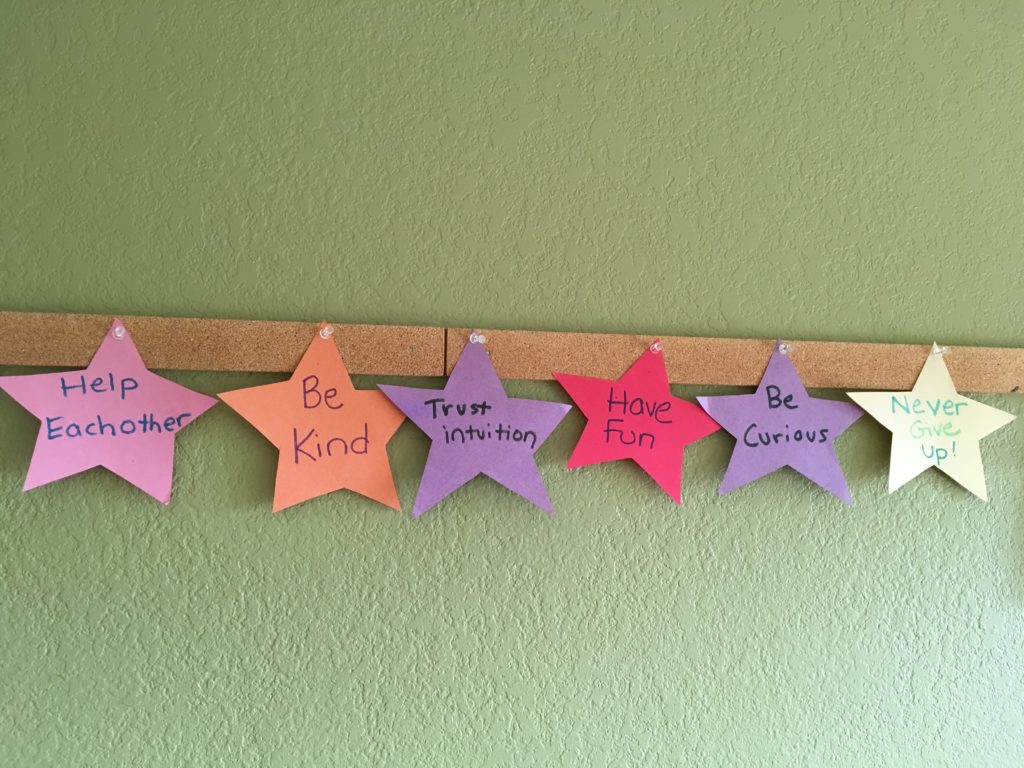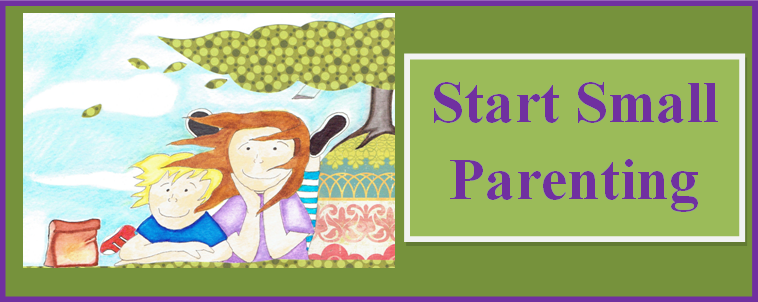 Speaking negatively could hurt you but speaking positively never will.
Speaking negatively could hurt you but speaking positively never will.
Don’t hit your sister.
You can’t seem to remember to hang up your coat.
Stop interrupting me.
There is too much yelling in here.
You never want to brush your teeth.
Why can’t you pick up your toys?
All day long, negative comments like these come out of parents’ mouths. The outcome is often less than desirable. A child may talk back to the parent with his own version of negativity, including defensiveness, angry words, or off-track behavior. He might ignore the parents’ voice or do the exact opposite of what is asked. What the parent wants is cooperation. But this is often not what the parent gets.
Credit Report
A cooperation strategy essential to 3R’s Parenting is a Credit Report. This means finding opportunities to comment on your child’s behavior when she is doing something right, instead of when she is doing something wrong.
In a dream fantasy, my child would be able to complete a large clean-up task – let’s say, carrying dinner dishes off the table, filling the dishwasher, washing the pots, and cleaning the counter – all without reminders. If your family is like mine, though, there are a lot of steps before a child gets to the independent place of fulfilling clean-up to that degree. How can we find the positives in the small steps so the child wants to do more?
This can be difficult as we parents are hard-wired to see what is NOT done – dirty dishes on the counter, the coat on the floor, the toothpaste tube without a lid, the unfed fish, etc.
All day long, parents tell their kids to stop annoying behaviors or bothersome bad habits. Positive attention works wonders to help children understand what you want them to do. Instead of saying what the child is NOT doing, notice any step in the right direction. Give positive feedback or “credit.” Use facts so the praise is descriptive instead of generic.
- You took a deep breath even though it looked like you wanted to hit your sister.
- You didn’t interrupt. You waited until I finished talking to Daddy.
- It’s so quiet in the play room.
- I’ve noticed that you hung up your coat today.
- You took a bite of broccoli.
Credit Reports eliminate nagging, diminish dawdling, and feel great for your child to receive. It’s amazing how effective this is instead of reporting what she didn’t do.
Look for the positive in the start of doing an act. Even if it’s not complete, what steps can you descriptively praise? Or comment positively if she refrains from doing an off-track behavior. Your positive attitude and loving support will be conveyed through your attentive response. This lights up feel-good parts of the brain in your child and encourages them to want to do more.
Here are some examples:
ACTION: Your son dried his hands on the towel instead of his shirt.
CREDIT REPORT: You used the towel instead of your shirt. That helps keep your clothes clean.
ACTION: Your daughter is upset at her brother for kicking her sand castle. She tells him that makes her mad.
CREDIT REPORT: You used your words to let him know how you feel. There was no kicking back.
ACTION: Your son likes to run around the store as fast as he can. You have been helping him to practice staying by your side.
CREDIT REPORT: This whole aisle you stayed by my side. There was no running. Do you want to hold my hand again in the next aisle or are you ready to go back in the cart?
ACTION: Your child usually resists cleaning his room. He grumpily puts his Lego model on the shelf.
CREDIT REPORT: You put your space ship on the shelf. That’s a step toward a clean room.
How We Praise
It’s important not to mix up the idea of Credit Reports with culturally-common general praise, or Blanket Praise, which often sounds like this:
Good Job.
You are so good at singing.
What a beautiful drawing!
Be a good boy and you’ll get a cookie.
Blanket Praise often contains superlatives like good or excellent. The parent usually has a positive intent to connect with the child or use the praise as encouragement for them to continue or repeat an activity or behavior. Blanket Praise, though, can have negative effects.
Blanket Praise is general, over-used, and even manipulative to get a child to respond a certain way. The praise might even be undeserved by the child, for example, “Good job. You’re jumping.” Kids naturally jump. Praise for jumping is definitely confusing.
Parents’ exuberant reactions can take away from the child’s experience rather than add to it. This kind of praise can even be harmful. It undermines children’s motivation, creates pressure to continue performing well, discourages risk-taking, and reduces independence. Humans tend to lose interest in activities for which they have been praised. Unrealistically high standards can even become a source of pressure and make a child feel inadequate.
Blanket Praise is an external motivator as are rewards like stickers, toys, sugar, and even your voice. Rewards are on the scale of punishment, using coercion to get a child to change their behavior. This can move into the realm of bribery, which is also similar to threats in its negative outcomes.
Let’s take the parent’s comment, “Good job.” You can hear Good Job all around us – at the park, supermarket, family events. It is so commonplace in our culture that sometimes parents aren’t even aware that they say it.
This statement contains a judgment. Parenting expert, Alfie Kohn, argues that it’s as much an evaluation as “Bad job.”* Children deserve to delight in their accomplishments instead of being judged.
“Good job” is also used as a way to get our kids to do what we want. We praise them. They want more praise, so they do the behavior to get more praise. Kohn coined the term “praise junkies” – the more praise children receive, the more they rely on adult evaluations instead of forming their own judgments.
Credit Reports are not Blanket Praise. A big difference is being descriptive and specific.
The more specific your statement, the better.
6 Ways to Give a Credit Report – I.S.N.E.A.T.
What to say or do instead of praise? Here are six ways to react to your child using a Credit Report: positive, respectful words and actions that allow her to internalize on-track behaviors and leave room for personal experience.
1. Inquire
Give the child the opportunity to say what he likes about his work. Ask him what it was like to make his creation or perform an action. What is his favorite part about it? How does that make him feel?
– Do you have a favorite section of your LegoMobile?
– What did it feel like to clean your room?
– How does it feel to have finished making that tower?
– Can you tell me more about this?
2. Six Words
Rachel Macy Stafford of the Hands Free Mama blog recommends saying six words to your child:
– I love to watch you _______.”
When my son swam his heart out in grade school swim races, I heard other parents at the end of the pool repeatedly say to their child, “Good job. You were awesome.” The parents’ sentiments were positive and meant in the best possible way. The kids I saw, though, made no response. What were they to say to that definitive judgment? What if they felt differently? Was their room to say so?
Instead, I said: “I love to watch you swim. Your legs were churning the water so fast. It’s exciting to see that happen.” My son beamed with the acknowledgment and continued the conversation, offering what he liked about the swim.
These six words contain in “I” statement. That gives the child a chance to reflect on his “I”. He will more easily be able to see if he agrees or disagrees with the parent’s statement or find where his experience might have been different – without having to struggle with a definitive statement that said what a “good” job he did.
3. Narrate
Use descriptive praise by giving specific feedback. Say what you see. Provide information about what the recipient did right.
– You painted the background first so that the colors blended evenly.
– You made the change in your kick that the swim coach mentioned.
– You did what I asked the first time. Now there’s time to play.
This is more helpful than general praise and it conveys what standards you feel are important.
Instead of hearing what they did wrong or what they should not be doing, positive observation catches children in the act of doing the on-track behavior you have been teaching or asking of them. This is so different from how parents normally respond that it definitely takes practice.
4. Effort
Instead of praising kids for their ability, praise them for things that they can clearly change—like their level of effort or the strategies they use. Quality is more important than quantity. Give praise that is sincere and genuine and focused on the effort, not the outcome.
– You have been writing that story since lunch. That shows perseverance.
– I was watching how you studied the stream and found a way to jump across.
– I noticed how you really focused on washing that pot.
5. Affecting You
How do the child’s actions affect others?
– When you helped rake the leaves, we had time to build a fort.
How are you, as the parent, affected? It’s okay to say the effect something has on you.
– I felt emotional when you played that piano solo. It reminded me of your grandmother.
The child will feel your engagement and observe your attention. These are powerful motivators and help create connection.
6. Thankful
Our appreciation is important for our children to hear. Another way to use a Credit Report is to make your appreciation known. Help your child see that she lives in a grateful household.
– I really like when you use kind words to talk to your sister.
– You took out the trash. I appreciate that.
– Thank you for following the steps on your Routine Chart tonight. That helps us all get to bed on time.
Add a Family Value
If you’ve had several Family Meetings, you may have clarified some of your family values. Examples include cooperation, patience, respectful voice, helping each other, kind words, or perseverance.
Heighten your Credit Report statement by adding a family value to the report.
– You put your clothes on by yourself. You’re being independent.
– You brushed your teeth without complaining. That’s respectful.
– You carried off your dishes. Your cooperation helps the whole family.
How to Use a Credit Report
At first, it was very difficult for me to get into the habit of pointing out the positive. I think of myself as a positive person. But I found myself nagging to try to get the rest of my family to live up to my standards of cleanliness, self-care, responsibility, etc.
For a week, try carrying around a little notebook and jot down all the steps family members are taking in the right direction. They might not complete a task or fulfill a request to the end, but any steps can be noted. Refer to the book each night and make positive comments to those you live with.
Avoid using “but” in your Credit Report, which often negates the first part of what was said. “You cleaned up most of your room, but you forgot the dust the shelves.”
Avoid talking about what could be more fair, or how the child was treated unfairly. Often kids use this word when they are just stating that they don’t like something. If we buy into the literal meaning of the word, we can get caught in a trap of trying to make the world fair for our kids or give them a skewed view of the world. There is unfairness in life, like discrimination and poverty, but our kids are probably not actually receiving unfair treatment.
Watch for judgments you might make, rather than the recommended observation of emotions. “Hate” or “Like” do not allow for the transitory ever-changing world of feelings.
Respectful Behavior and Cooperation:
– Twice this week you hung up your jacket.
– When you wanted a glass of water, you got it for yourself. You didn’t expect me to get it. That shows self-reliance.
– You didn’t win and you’re not crying.
– You haven’t walked away even though I don’t think you want to hear what I’m saying.
– I can see you’re both angry, but no one is hitting. Arguing is okay, but hitting’s not.
– You answered in a friendly voice even though it can be upsetting to get interrupted when you’re on the computer. That’s respectful.
– When it was time to play alone, you didn’t complain or cry. You did it for 15 minutes.
– You remembered the rule about no video games until you finish your homework.
– You played with your doll when I needed to talk to Grandma.
– Thanks for not throwing your toys, even though you seem mad you can’t keep playing. This helps keep the playroom neat.
– You remembered the new rule and got your things all ready to go before breakfast.
Family Contributions and Requests:
– You got in your car seat right when I asked. That’s cooperation.
– Thank you for taking your plate off the table. I didn’t even ask you to do that.
– You probably wish you didn’t have to set the table every night. You took the trashcan to the curb without me asking.
– Thanks for cleaning up the spilled milk.
– When I asked you to clean the bathroom mirror, you did it the first time I asked.
– Having to stop and feed the dog might be frustrating, especially when you want to keep playing.
– I asked you to help put together the new bookshelf and you did.
Mornings:
– You set the alarm and got up all by yourself this morning. I was still in bed when I heard the shower running.
– Your bed looks so comfy, but you’re rolling towards me and not complaining.
– Yesterday you jumped out of bed and got ready before you ate breakfast, which helped us all be calm getting out the door.
– You’re not on your phone because you remembered that comes only after you’re all ready to go out the door.
– You remembered the new rule. No media in the morning.
– I’m glad you picked up your room this morning. That shows self-reliance.
Dinner-time:
– You remembered to use your napkin. Your shirt is still clean.
– You’re eating what you want and leaving what you don’t want, without complaining. That takes self-control.
– You’re using an inside voice at the table. That’s one of our values, to have respectful conversation during meals.
– Even though you want to talk, you’re waiting your turn.
– I asked you to take your toys off the table and you did without getting upset.
– It’s nice to have dinner together when no one is on their phone.
– Thank you for staying here at the table even though you’re done eating.
Bedtime:
– You brushed your teeth for two full minutes just like the dentist asked.
– You’re already dressed for bed. That’s self-reliance.
– Last night, you waited until you saw the morning light to come into our room.
– You remembered the rule. One book, one song, and lights out.
– You waited until I came in this morning to get out of bed.
– You only called out once last night for water.
The impact of your positive words and recognition are part of successfully building a 3Rs family. Like many of the tools in this blog, the magic is in the consistency and repetition.

